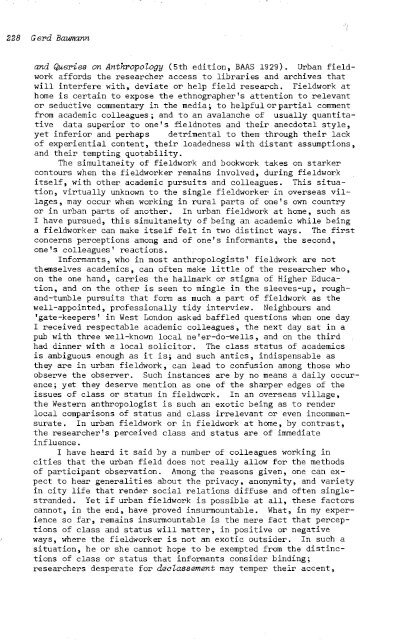CONTENTS NO.I - Institute of Social and Cultural Anthropology ...
CONTENTS NO.I - Institute of Social and Cultural Anthropology ...
CONTENTS NO.I - Institute of Social and Cultural Anthropology ...
Create successful ePaper yourself
Turn your PDF publications into a flip-book with our unique Google optimized e-Paper software.
228 Gerd Baumann<br />
<strong>and</strong> Queries on Anthropotogy (5th edition, BAAS 1929). Urban fieldwork<br />
affords the researcher access to libraries <strong>and</strong> archives that<br />
will interfere with, deviate or help field research. Fieldwork at<br />
home is certain to expose the ethnographer's attention to relevant<br />
or seductive commentary in the media; to he Ipful or partial comment<br />
from academic colleagues; <strong>and</strong> to an avalanche <strong>of</strong> usually quantitative<br />
data superior to one's fieldnotes <strong>and</strong> their anecdotal style,<br />
yet inferior <strong>and</strong> perhaps detrimental to them through their lack<br />
<strong>of</strong> experiential content, their loadedness with distant assumptions,<br />
<strong>and</strong> their tempting quotability~<br />
The simultaneity <strong>of</strong> fieldwork <strong>and</strong> bookwork takes on starker<br />
contours when the fieldworker remains involved, during fieldwork<br />
itself, with other academic pursuits <strong>and</strong> colleagues. This situation,<br />
virtually unknown to the single fieldworker in overseas villages,<br />
may occur when working in rural parts <strong>of</strong> one's own country<br />
or in urban parts <strong>of</strong> another. In urban fieldwork at home, such as<br />
I have pursued, this simultaneity <strong>of</strong> being an academic while being<br />
a fieldworker can make itself felt in two distinct ways. The first<br />
concerns perceptions among <strong>and</strong> <strong>of</strong> one's informants, the second,<br />
one's colleagues' reactions.<br />
Informants, who in most anthropologists' fieldwork are not<br />
themselves academics, can <strong>of</strong>ten make little <strong>of</strong> the researcher who,<br />
on the one h<strong>and</strong>, carries the hallmark or stigma <strong>of</strong> Higher Education,<br />
<strong>and</strong> on the other is seen to mingle in the sleeves-up, rough<strong>and</strong>-tumble<br />
pursuits that form as much a part <strong>of</strong> fieldwork as the<br />
well-appointed, pr<strong>of</strong>essionally tidy interview. Neighbours <strong>and</strong><br />
'gate-keepers' in West London asked baffled questions when one day<br />
I received respectable academic colleagues, the next day sat in a<br />
pub with three well-known local ne'er-do-wells, <strong>and</strong> on the third<br />
had dinner with a local solicitor. The class status <strong>of</strong> academics<br />
is ambiguous enough as it is; <strong>and</strong> such antics., indispensable as<br />
they are in urban fieldwork, can lead to confusion among those who<br />
observe the observer. Such instances are by no means a daily occurence;<br />
yet they deserve mention as one <strong>of</strong> the sharper edges <strong>of</strong> the<br />
issues <strong>of</strong> class or status in fieldwork. In an overseas village,<br />
the Western anthropologist is such an exotic being as to render<br />
local comparisons <strong>of</strong> status <strong>and</strong> class irrelevant or even incommensurate.<br />
In urban fieldwork or in fieldwork at home, by contrast,<br />
the researcher's perceived class <strong>and</strong> status are <strong>of</strong> immediate<br />
influence.<br />
I have heard it said by a number <strong>of</strong> colleagues working in<br />
cities that the urban field does not really allow for the methods<br />
<strong>of</strong> participant observation. Among the reasons given, one can expect<br />
to hear generalities about the privacy, anonymity, <strong>and</strong> variety<br />
in city life that render social relations diffuse <strong>and</strong> <strong>of</strong>ten singlestr<strong>and</strong>ed.<br />
Yet if urban fieldwork is possible at all, these factors<br />
cannot, in the end, have proved insurmountable. What, in my experience<br />
so far, remains insurmountable is the mere fact that perceptions<br />
<strong>of</strong> class <strong>and</strong> status will matter, in positive or negative<br />
ways, where the fieldworker is not an exotic outsider. In such a<br />
situation, he or she cannot hope to be exempted from the distinctions<br />
<strong>of</strong> class or status that informants consider binding;<br />
researchers desperate for deaZassement may temper their accent,

















